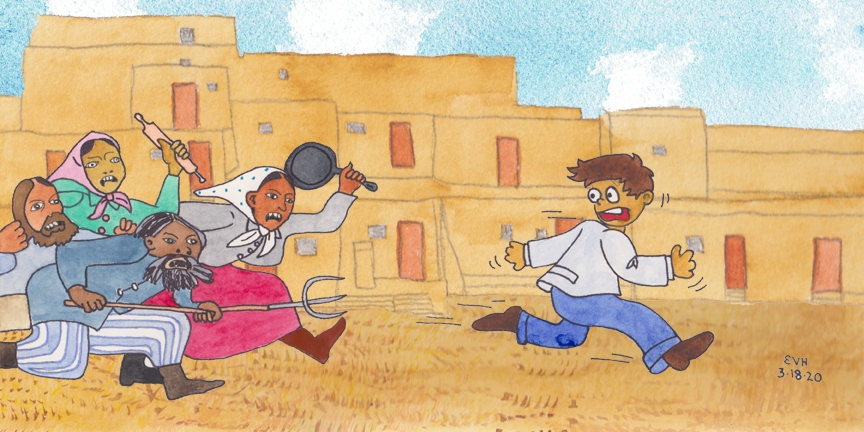
Jataka 231
PUpāhana Jātaka
The Pair of Shoes
as told by Eric Van Horn
originally translated by William Henry Denham Rouse, Cambridge University
originally edited by Professor Edward Byles Cowell, Cambridge University
This is another story where Devadatta gets the usual bad treatment. And once again it may seem that his treatment was a little harsh. But there is also a lesson in here about humility. The pupil is supposedly taught everything that his Master knows. But a lot of mastering a skill cannot be taught. It is something that you feel deep in your bones. And until you have that deep sense of knowing, it is probably best to exercise a little humility!
“As when a pair of shoes.” The Master told this story when he was staying in the Bamboo Grove (Veluvana). It is about Devadatta. The monks gathered together in the Dharma Hall and began to discuss the matter. “Friend, Devadatta repudiated his teacher and became the foe and adversary of the Tathāgata. And as a result he has come to utter destruction.”
The Master came in and asked what they were discussing. They told him. The Master said, “Monks, this is not the first time that Devadatta has repudiated his teacher and become my enemy and as a result come to utter destruction. The same thing happened before.” Then he told them this story from the past.
Once upon a time when Brahmadatta was the King of Benares, the Bodhisatta was born as the son of an elephant trainer. When he grew up, he was taught the art of managing an elephant. Later there came a young villager from Kāsi, and the Bodhisatta taught him the art of managing elephants as well. Now when the future Buddhas teach anyone, they do not teach in a stingy way. They teach everything that they know, keeping nothing back. So this youth learned all the branches of knowledge from the Bodhisatta without omission. And when he had learned, he said to his Master:
“Master, I will go and serve the King.”
“Good, my son,” he said. And he went to the King and told him that a pupil of his would serve the King. The King said, “Good, let him serve me.”
“How much will you pay him?" the Bodhisatta asked.
“A pupil of yours will not receive as much as you. If you receive 100 gold coins, then he shall receive 50. Whatever you should receive, he will receive half of that.” So the Bodhisatta went home and told all this to his pupil.
“Master,” the youth said, “I know everything that you know, piece by piece. If I shall receive the same payment, I will serve the King. But if I do not receive the same payment, then I will not serve him.” And the Bodhisatta told this to the King.
The King said, “If this young man can do the same as you, if he is able to show skill for skill with you, he will receive the same pay.”
And the Bodhisatta told this to the pupil. The pupil answered, “Very well, I will.”
“Tomorrow,” the King said, “Show us your skill.”
“Good, I will. Let this demonstration be proclaimed by the beat of drum.” And the King commanded it to be proclaimed. “Tomorrow the master and the pupil will show their skill in managing the elephant. Tomorrow let all who wish to see this test gather together in the courtyard of the palace.”
“My pupil,” the teacher thought to himself, “does not have all of my resources and experience.” So he chose an elephant, and in one night he taught him to do everything backwards. He taught him to go back when told to go forward, and to go forward when told to go back. He taught him to lie down when told to get up, and to get up when told to lie down. He taught him to drop when told to pick something up, and to pick something up when told to drop.
On the next day he mounted his elephant and went to the palace yard. His pupil was already there. He was mounted on a beautiful elephant. There was a great crowd of people. Both the Master and the pupil showed off their skills. But the Bodhisatta gave his elephant reverse orders. “Go forward!” he whispered so no one could hear, and it backed up. “Back up!” he whispered, and it ran forward. “Stand up!” he said, and it lay down. “Lie down!” he said, and it stood up. “Pick it up!” he said, and the creature dropped it. “Drop it!” he said, and he picked it up.
When the pupil tried to command the elephant, the elephant did the reverse of what he commanded. The crowd cried, “Go away, you rascal! Do not raise your voice against your Master! You do not know your limitations, and you think you can match yourself against him!” They assaulted him with clods of dirt and pieces of wood so that he gave up and ran away.

Figure: No Match for the Master
The Bodhisatta got down from his elephant. He approached the King and said, “Oh mighty King! For their own good men are taught. But there was one to whom his learning brought only misery, like a poorly made shoe.” And he uttered these two stanzas:
“As when a pair of shoes which one has bought
For help and comfort cause but misery,
Chafing the feet till they grow burning hot
And making them to blister by and bye.
“Even so an arrogant ignoble man,
Having learned all that he can learn from you,
But that same teaching proved his own rue,
The lowbred churl is like the ill-made shoe.”
The King was delighted and heaped honors upon the Bodhisatta.
When this discourse ended, the Master identified this birth as follows: “Devadatta was the pupil, and I was the teacher.”
